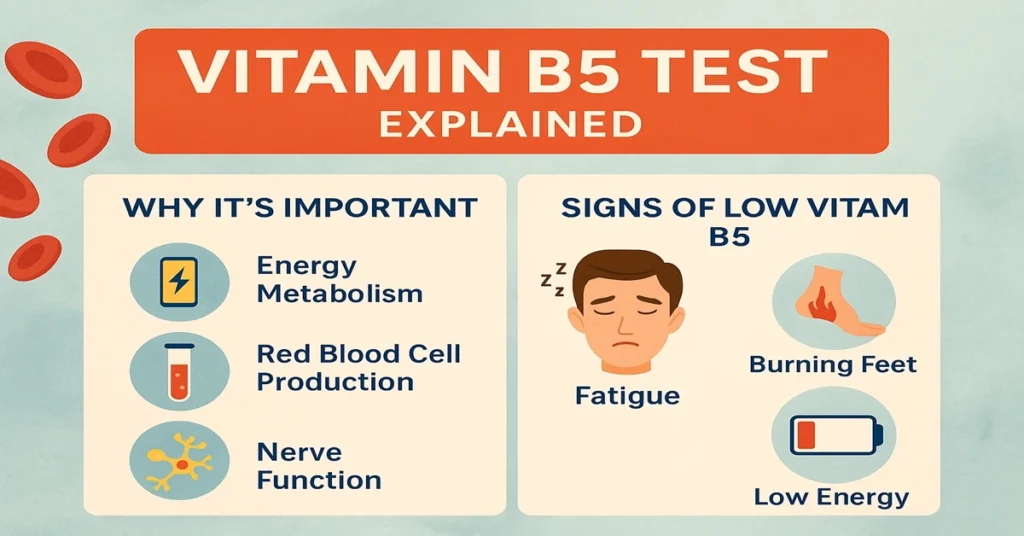What is Vitamin B5?
Vitamin B5, also known as Pantothenic Acid, is a water-soluble vitamin that belongs to the B-complex group of vitamins.
It plays a very important role in the body’s energy production, fat metabolism, and red blood cell (RBC) formation.
Vitamin B5 is a major part of a molecule called Coenzyme A (CoA) — this coenzyme helps our body break down food (fats, carbohydrates, and proteins) into energy that cells can use.
Because it also supports the adrenal glands, which release stress-related hormones like cortisol, it is sometimes called the “anti-stress vitamin.”
Where is Vitamin B5 Produced in the Body?
The human body cannot make Vitamin B5 on its own.
It must come from food sources such as meat, eggs, dairy products, whole grains, avocados, mushrooms, and broccoli.
A small amount of Vitamin B5 is produced by gut bacteria (intestinal microflora), but this amount is not enough to meet the body’s daily needs.
Main Functions and Importance
Vitamin B5 supports several critical functions in the body:
1. Energy Metabolism
It is an essential part of Coenzyme A (CoA) — a molecule needed for converting fats, proteins, and carbohydrates into usable energy.
Without enough Vitamin B5, the energy cycle of cells slows down, leading to fatigue and weakness.
2. Hormone Production
It helps the adrenal glands produce important hormones like cortisol, which help the body manage stress and maintain immune balance.
3. Fatty Acid Synthesis and Breakdown
Vitamin B5 assists in synthesizing and breaking down fatty acids, which are vital for healthy cell membranes and hormone balance.
4. Red Blood Cell Formation
It supports the creation of red blood cells, which carry oxygen throughout the body.
5. Wound Healing and Skin Health
Pantothenic acid helps repair skin tissue, reduce inflammation, and promote faster wound healing.
It is also used in some skin and hair care products.
6. Nervous System Support
Vitamin B5 aids in neurotransmitter synthesis (the brain’s chemical messengers), helping maintain nerve health and brain function.
Causes of Low Vitamin B5 Levels (Deficiency Causes)
Vitamin B5 deficiency is rare, because it is found in many foods.
However, certain conditions can lower its levels:
- Severe malnutrition or an unbalanced diet
- Chronic alcoholism, which reduces absorption and intake
- Prolonged fasting or starvation
- Gastrointestinal disorders (like Crohn’s disease or celiac disease) that cause poor absorption
- Genetic conditions that affect vitamin transport (very rare)
Symptoms of Vitamin B5 Deficiency
Though uncommon, deficiency symptoms can appear as:
- Constant fatigue and weakness
- Numbness, tingling, or burning in the hands and feet (known as “burning feet syndrome”)
- Headache, irritability, restlessness
- Sleep disturbances or depression
- Digestive issues like poor appetite or abdominal discomfort
- Muscle cramps and weakness
Because these symptoms are non-specific, a blood test is the only way to confirm low Vitamin B5 levels.
Causes of High Vitamin B5 Levels
High Vitamin B5 levels are extremely rare, since it is a water-soluble vitamin — the body simply removes excess amounts through urine.
Possible causes include:
- Excessive intake of Vitamin B5 supplements
- Intravenous nutrition (rare medical cases)
Symptoms of High Vitamin B5 (Toxicity)
There is no known serious toxicity from normal dietary intake.
However, extremely high doses from supplements can cause:
- Mild diarrhea
- Nausea or stomach discomfort
- Rarely, increased bleeding tendency (especially if combined with blood thinners)
Normal Range (Reference Range)
| Parameter | Normal Range |
|---|---|
| Vitamin B5 (Pantothenic Acid) | 1.0 – 5.0 µg/mL (may vary slightly by laboratory) |
Levels below this range indicate deficiency, and levels above are usually harmless unless caused by excessive supplementation.
Sample Type and Test Method
- Sample type: Blood (plasma or serum)
- Test purpose: Measures the amount of Pantothenic Acid in circulation.
- Fasting: Usually not required, but the doctor may advise if other tests are done together.
Test Preparation
To get accurate results:
- Inform your doctor about any supplements or multivitamins you take, as they may alter results.
- Avoid taking Vitamin B complex tablets at least 12–24 hours before the test.
- Stay hydrated and follow any specific fasting instructions your doctor gives.
When to Consult a Doctor
You should consult your doctor if:
- You feel unexplained fatigue or weakness
- You experience burning or tingling in the feet or hands
- You have slow wound healing or hair fall
- You take supplements regularly and want to check for safe levels
- Your doctor suspects a malabsorption disorder or nutritional deficiency
After reviewing your blood test, your doctor may suggest:
- Dietary improvements
- Vitamin B-complex supplementation
- Further tests if absorption problems are suspected.
Important Word Explanations
| Word | Meaning |
|---|---|
| Pantothenic Acid | Scientific name for Vitamin B5. |
| Coenzyme A (CoA) | A molecule that helps enzymes convert food into energy. |
| Adrenal Glands | Small glands on top of kidneys that release stress hormones like cortisol. |
| Neurotransmitters | Chemical messengers in the brain that help nerve cells communicate. |
| Paresthesia | A sensation of tingling or burning in the skin (e.g., “burning feet syndrome”). |
~END~

